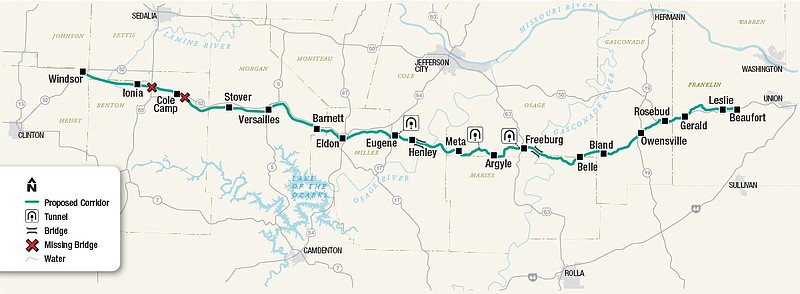A proposed recreational walking, biking and horseback riding trail in Central Missouri would likely bring more tourism as well as help residents be more active, according to an analysis by the University of Missouri Extension Service.
The proposal would convert a 144-mile abandoned stretch of the former Rock Island Railroad corridor - from Windsor to Beaufort - for trail use. The Missouri Department of Natural Resources has until Feb. 21 to decide whether to accept the corridor from Ameren. If accepted, the trail would become a state park and require maintenance from the State Parks division.
"We had a hard time coming to any kind of conclusions other than this is kind of a no-brainer," said Pat Curry, who co-authored the Infrastructure that Strengthens Communities report with Martha Bass.
MU Extension outlined the background and community impact of the proposed trail in a 33-page report, which found the trail could benefit the community and state from the standpoints of history, health, safety and economy.
"The economy along that part of Missouri, there's some good things going on but overall, that area needs a boost, and I think this is the sort of thing longer term that is going to have a real impact in those communities," Curry said.
Eldon, one of the 16 incorporated places along the corridor, is the only city where population growth was recorded in the last seven years.
Population loss was noted in the other areas. The report suggests the trail's location near the state's most "prominent outdoor recreation areas" Lake of the Ozarks State Park and Truman Lake Mountain Bike Park would be key to its success.
According to the report, the state is saving millions of dollars in land acquisition with the donation by Ameren unlike the Katy Trail which required the purchase of miles.
"We observed State Parks has seemed focused the past two years on the cost of developing a clone of the Katy Trail, which is not necessary," said Greg Harris, executive director of Missouri Rock Island Trail Inc., which paid for the study.
From more than 8,500 public comments, staff noted in the report 98.6 percent of the comments were in support of the trail, while 1.2 percent were opposed and 0.2 percent seemed undecided or without a clear position.
When working on the report, Curry said, it was difficult to find anything negative about developing trails.
"We tried," Curry said. "They have substantial impacts that are measurable like economic impacts."
While MU Extension was working on the report, DNR hosted community meetings within the last month in Owensville, Versailles and Meta so residents along the corridor could ask questions and hear factors State Parks are considering in the decision about the trail.
"The community meetings went really well," said Mike Sutherland, Missouri State Parks deputy director of administration. "We were able to hear concerns and comments from the people who attended, which also goes into our decision-making process."
Ivie Helton, a Meta alderwoman, said the Nov. 1 meeting gave her and the community more information.
Helton said, "We want to make sure that the citizens that are going to be affected by the trail, that it's going to be a positive experience for them. If they do (benefit), then we're 100 percent supporting that and going to make the most of that as well."
Missouri Farm Bureau has been labeled as the only clearly opposed group, saying it is concerned about property rights and safety.
Comments about the trail from community members are still being accepted on the DNR website. The comment period ends Nov. 30. The State Parks Division said those comments will be considered as it decides if the state will accept the 144-mile gift from Ameren.
DNR officials also said they are still assessing potential trail infrastructure issues, including fenced cattle crossings and lack of bridges.
"All of those infrastructure issues are still there and still important as we're going through our process," Sutherland said. "We wanted to get a little bit more focused input and really ask people to give us their opinions on what the important factors are to them as we consider our decision."
He said any DNR decision about the trail would have to consider the effect it would have on the whole parks system, especially from a budgetary standpoint.

